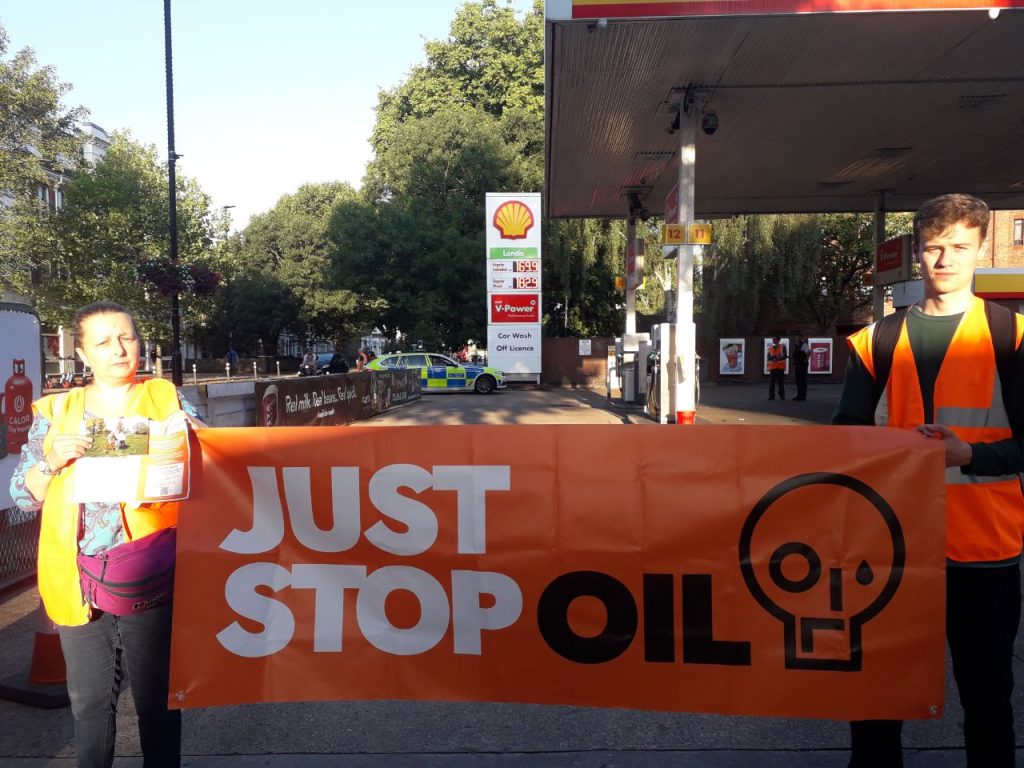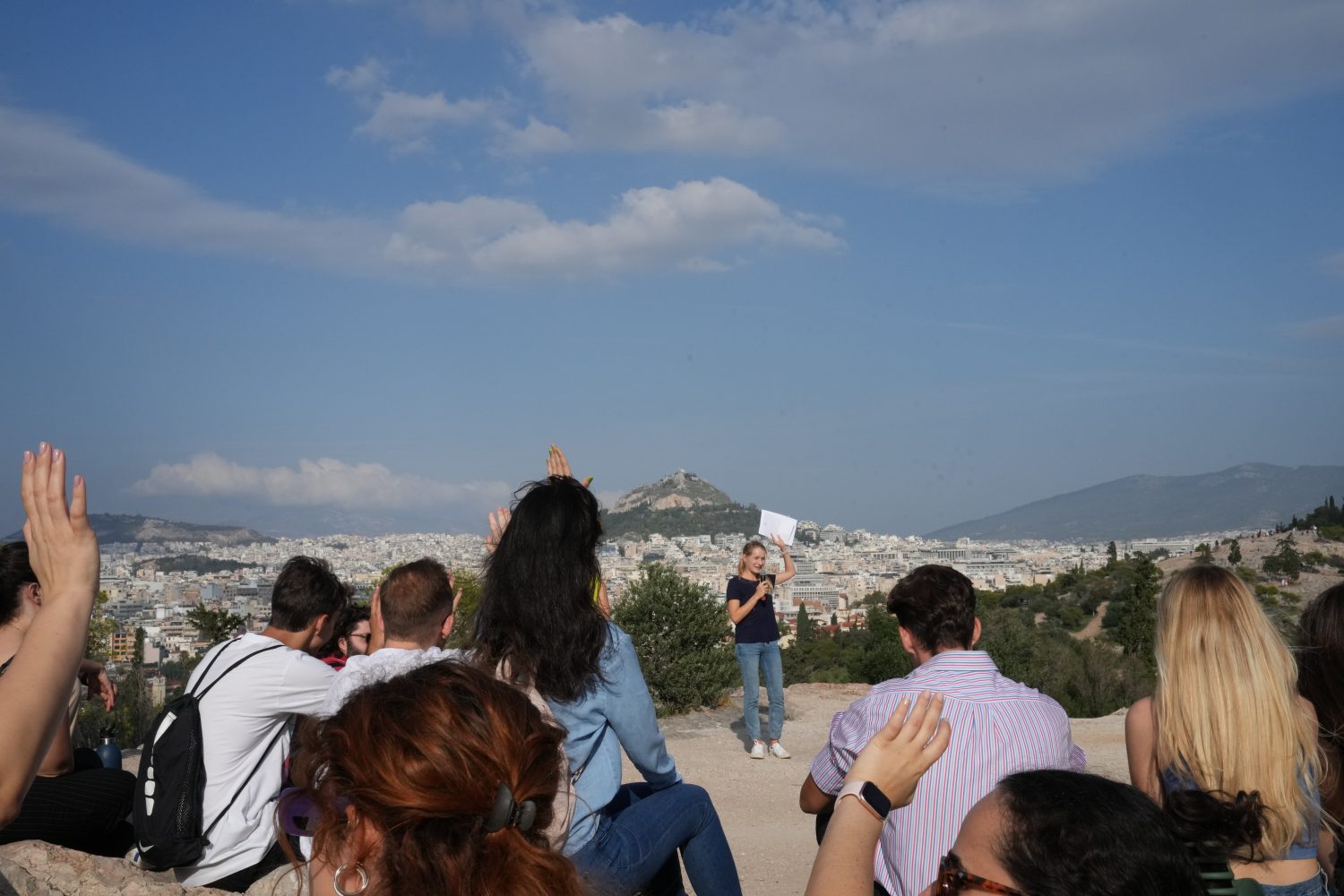Just Stop Oil activist Bertie Coyle argues why we need deliberative democracy now.
Politics is broken but democracy is the cure. That’s the call coming from the corner of the ‘environmental movement’ that I stand in – an organisation called Just Stop Oil. Based in the UK, we’re part of the A22 network, a global coalition of like-minded groups which take disruptive direct action against drivers of the climate crisis.
Just Stop Oil is called a radical group by Britain’s media. But we must take this with a pinch of salt because these media institutions are the other face of the coin to parliamentary politics, which we agreed was broken in the first sentence. I don’t think we’re that radical. That we’re in civil resistance may be, and this is essential to overturn the corrupt systems. But the demand for ‘No New Oil and Gas Licences in the UK’ is quite a reasonable goal. Moderate, even.
A radical ask might be demilitarisation. Or the abolition of police and prisons. Or the end of rentierism, finally allowing landlords to retrain as ballet dancers, and train drivers, and watchmakers. These sorts of programmes could shift the systems of inequality and violence which prop up the power of a few at the expense of the masses. They sound radical to me both in the sense of ‘radical, dude!’, but also ‘radical change’. Comparatively, starting the slow process of winding up noxious carbon fuels for cheap and cheerful renewables doesn’t seem like a big ask.
Finally stopping oil might not end business as usual. Resources will flow from the south to north, valuable things will be made by workers and owned by bosses, and GDP growth will be the metric by which we measure the value of life. Some companies may go bankrupt. But that’s not a radical change. There was probably a time when the Zeppelin market was considered too big to fail and local anarchists scrawled “IT IS EASIER TO IMAGINE AN END TO THE WORLD THAN AN END TO BLIMPS” in pedestrian underpasses. Next thing you know the Hindenburg disaster happens and everyone gets used to aeroplanes instead. Capitalism grinds on.
The energy transition could be radical if it made the means of creating electricity a common good. But if it replicates the same exploitative structures that we see now, just with less emissions, it won’t realise its radical potential. In fact, that might save capitalism.
With all that being said, we’re having a mighty struggle with this (on the face of it) reformist demand. A majority of British society is against the extraction of oil and gas. It makes you think. The government and the media, that horrible coin we picked up earlier, are both riding out for a sunset industry that is causing the worst crisis the world has seen since the Cretaceous-Paleogene extinction event. You would be forgiven for thinking they are not working in our best interest, or even the interest of their own class. It’s a mystery.
Mysteries like this, strange conflicts that fail to collapse under the weight of their contradictions, must be the result of system failure. A system that functions for a time can stop functioning due to external change. Even if it was better than the last one, it has now failed. Representative politics is better than feudalism. But feudalism was better than slavery. The hobbled form of democracy we currently have is not up to the task of softening the blow of global climate collapse, let alone stopping it. This is unarguable. We’ve passed 1.5C warming, and 2C is locked in.
People didn’t vote for this. They didn’t vote for the UK’s rivers to be looped into the sewerage system, and they didn’t vote for a genocide in Gaza either. But here we are: swimming is an extreme sport and our government funds the companies that make white phosphorus munitions for Israel. British politics, so-called representative democracy, is producing self-replicating errors, glitching into a broken loop of toxic interests. The causes for this failure are malignant, but the cure isn’t.
Citizens’ assemblies (sometimes ‘people’s’ or ‘jury’) are a model of direct democracy that orients power from the bottom-up. Creating policy through this kind of open, deliberative process is more empowering than liberal democracy. Rarely are people asked to speak their minds, even less be listened to. But it’s a liberating experience, and creates enormous goodwill. That’s because we’re not intrinsically buyers of a political product, but community members.
“We’re not intrinsically buyers of a political product, but community members.”
Fully realised, the citizen’s assembly model is a paradigm shift to a new, deeper form of democracy and popular empowerment. A salve to the political process. In this very moment it’s the tool to plan, organise, and execute progressive campaigns that win elections. In the years to come it will be embedded into the process of government – selected by sortition, like a poll, so that big money can’t corrupt it.
“Fully realised, the citizen’s assembly model is a paradigm shift to a new, deeper form of democracy and popular empowerment.”
An acerbic saying goes: liberals hear tone not content. Transgressive actions that call for reform are radical in tone, but not content. Having tea with your neighbours in the function room of a mosque and thrashing out local matters isn’t radical in tone, but it is in nature. Taking hammers to a petrol station feels more radical than a sober, directly democratic process to decide on key national issues – but it’s not necessarily. Perhaps we’ll be fair to the liberals who confuse tone for content by admitting that leftists can confuse ‘radical, dude!’ for ‘radical change’.
“Taking hammers to a petrol station feels more radical than a sober, directly democratic process to decide on key national issues – but it’s not necessarily.”
Liberal democracy has been captured by private interests, and the consequences of this can be measured in gargantuan units of suffering. Some reading this are certain that the climate crisis will cause global collapse in the coming year. Others would ridicule that prospect. Wherever you fall on this spectrum, you may agree that the path to a safer, more progressive future is self-government by the people. This is a radical proposition, more so than tinkering with the details of energy provision. Flip a coin – real democracy or fascism.
Bertie Coyle is a writer who takes action against climate collapse and border violence with Just Stop Oil. Just Stop Oil has formed Umbrella , a new hub to coordinate the creation of radical, nonviolent projects. Take part in this revolution at juststopoil.org.

© Just Stop Oil
